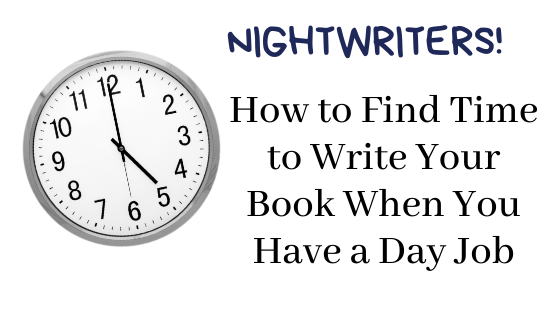Nightwriters: How to find time to write Your Book when You Have a day job
How do you find the time?
I get a lot of questions about publishing and writing, but this one is always in the top five. Since 2011, I’ve published two children’s books, two non-fiction books, two novels and ghostwritten many others. I have three children and like many, I don’t write books for a living, so I also work a full-time job. In addition, I have a few friends, some extended family and want to be able to climb a flight of stairs 20 years from now, so I’m engaged often in some type of activity.
I say this not to brag about getting it done, just to let you know that it is possible to get it done.
Disclaimer- I have not always done this “all” of the time. I have years, like last year, when I published two books. I’ve had years, like the two years before that, where I’ve published none. Creativity, much like available time, ebbs and flows, and part of being able to stay productive comes from learning to ride the waves; leaning into the creative bursts when they are the strongest, plodding along when it’s hard to find the time or the words, but most important, never taking your hands off of your work--never letting go.
That’s the broad answer to the big question of finding the time. But in this post, I’m going to break some of it down into bite-size pieces and share some of the ways that I get my writing done. Everyone’s process is different, but these are some of the things that work for me. Feel free to try some on for size.
Make time every day
I admittedly am not always 100% perfect with this. As I mentioned, sometimes the words are flowing and I can write for hours and be dragged kicking and screaming to a stop. Other days it takes every member of my mental army for me to get one word written on a page. But one great habit to get into when you start your writing project is to write every day. Set aside a period of time, even if it’s as short as 15 minutes, to be hands-on each and every day with your project. Even in the cases of extreme writer’s block, just go back and edit whatever you wrote before. Your goal is not to spend any significant time with your hands off of your project. It’s a lot harder to pick back up again than it is to never put it down.
Sprint
Getting to the finish line of a writing project will feel like a marathon, but scheduling some “sprints” throughout will help you get to your goal more quickly. To sprint, set a word count goal, sit at your computer and barring an emergency, don’t take part in any other activities until you’ve put that many words on the page. Your goal during a sprint is “quantity,” so don’t be as concerned about your words being outstanding, just get them down on the page. I’ve done sprints as short as 500 words and as long as 5,000 words--but the whole method is so that you can be hyper-focused for a period of time in working toward your goal.
Write First, Edit Later
One thing that I encourage authors that I am coaching to do is to just write the first draft and fight the urge to edit while writing. Your goal with your first draft is just to get all of the words out. Too much trying to write and fix what you’re writing at the same time can get you stuck in one place and frustrated. Remember--you can always come back and fix “bad” writing later, but if there’s nothing there you don’t have anything to fix.
Take Off Your Pants
Ok, so I actually do like to write in my comfortable clothes but that isn’t what I mean here. One of my favorite fiction writing resources is the book “Take Off Your Pants” by Libby Hawker. In Take Off Your Pants, Hawker shows you how to outline your book from beginning to end to make the process of getting from point A to point B infinitely easier. Honestly, I was a little hesitant at first because I like to just let it flow in my writing, but after a lot of time trying to let it flow and having it not even trickle, I realized ain’t nobody got time for that. I would recommend checking it out and seeing if you find that her method helps aid your productivity.
I hope this helps, and if you have any tips that have helped you get more of your writing work done along the way, please comment and share.

